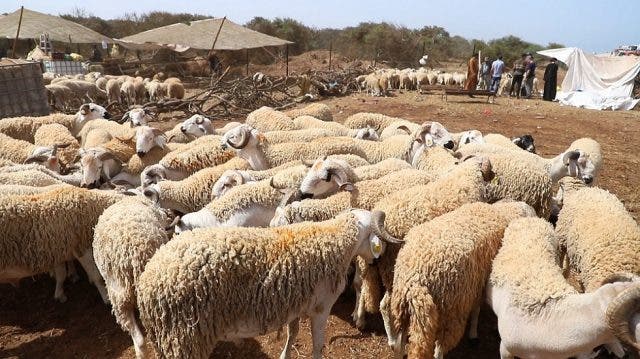Astronomer Ibrahim al-Jarwan from the Arab Union for Astronomy and Space Sciences said he predicts Eid al-Adha, the Islamic holiday to celebrate the end of the Hajj pilgrimage, is likely to fall on July 31 this year.
“The crescent of the lunar month of Dhu Al Hijjah 1441 is to be spotted on Monday, July 20, 2020, at 9.33 p.m. UAE time,” Al Jarwan said on June 14.
“July 22 will mark the first day of Dhu Al Hijjah month and Friday, July 31, shall be the first day of Eid Al Adha, according to astronomical calculations,” he continued.
Families that can afford it mark the second of Islam’s two biggest holidays by sacrificing an acceptable animal such as a sheep, goat, cow, or camel. The animal is then divided into three portions: One third for family, one third for friends and neighbors, and one third for the poor.
UAE-bound sheep stranded in Australia
Across the Gulf, thousands of live sheep arrive from countries like Australia in the lead up to Eid. One ship bound for the UAE, the “Al Kuwait,” has been stuck in Australia since May 22 after 21 of the 48 crew members tested positive for COVID-19 after docking in Fremantle, Western Australia—putting its 56,000 cargo of live sheep in limbo.
On June 13, the Australian Department of Agriculture approved an application for an alternative ship to leave with 50,000 of the 56,000 sheep originally supposed to be transported by the “Al Kuwait.” Australia has a moratorium on live sheep exports to the Gulf from June to September to protect animal welfare from the area’s extreme summer temperatures.
Kuwait renewed a plea to the Australian government to waive its moratorium on live export in the wake of a drop in international freight, which has significantly impacted fresh meat imports and supply in the Gulf state.
Kuwait’s Minister of Trade and Industry Khalid Nassir Alrowdan asked Australia’s Agriculture Minister David Littleproud to “reconsider the Australian livestock export ban during the hemisphere summer…to enhance our national food security and the Australian national economy.”
The latest request comes after the CEO of the state-run Kuwait Livestock Transport and Trading, Osama Boodai, wrote to the Australian government on April 2 asking it to “reconsider” the June to September ban.
“The current COVID-19 outbreak around the world has placed increased pressure on food supplies into the Middle East region,” Boodai said in his letter to Littleproud.
“The revered Eid Al Adha festival falls in late July and live animals are of critical importance to that occasion and we fear there will also be shortages then,” Boodai continued.
“Restricting the trade of Australian sheep puts the region’s sovereign food security at risk and damages very long time trading relationships,” Bodai warned.
It appears that the combined economic opportunity and the food insecurity issues raised by the Kuwait government forced the Australian government’s hand and pushed it to permit the one-off shipment.
Eid preparations begin
Morocco, like many Middle Eastern and North African countries, started preparing for Eid al-Adha just a few days after celebrating Eid al-Fitr. Over the past month, local authorities in Morocco tagged 4.5 million livestock, including sheep and goats ahead of the major religious holiday—a phenomenon playing out across the region.
On May 26, Moroccan Agriculture Minister Aziz Akhannouch announced some 2.6 million sheep had been selected and vaccinated in preparation for what is known in English as the “sacrifice holiday.”
“The COVID-19 pandemic did not stop us from celebrating Eid al-Fitr, but the Eid al-Adha celebration poses logistical challenges and requires good planning and organization,” Akhannouch said.
Moroccan authorities have also agreed to subside stock feed this year given the dry season and COVID-19 economic difficulties to ensure stock are in good condition for slaughter and to prevent high feed costs from impacting consumer prices.
Hajj could be canceled
In Saudi Arabia, it is shaping up to be a very different Eid al-Adha in 2020, and authorities are still considering whether or not to cancel the annual hajj pilgrimage.
In late July, some two million pilgrims usually flock to Saudi Arabia to complete what for many is a once-in-a-lifetime religious journey in the Muslim Holy Land, which ends in Eid al-Adha. Canceling the pilgrimage would be a first since the Gulf kingdom was founded in 1932 and could cost Saudi Arabia millions in visitor revenue.
Saudi Arabia has a high number of COVID-19 cases, and with the ongoing worldwide travel restrictions, the Saudi government said it will make a decision within the week about cancelling the 2020 hajj.
“The issue has been carefully studied and different scenarios are being considered. An official decision will be made within one week,” a senior official from Saudi Arabia’s Ministry of the Hajj and Umrah told the Financial Times on June 12.
One idea the ministry is considering is allowing a small number of local Saudi pilgrims, around 20% of the usual number, to complete the hajj.
“All options are on the table but the priority is for the health and safety of pilgrims,” the official said.





